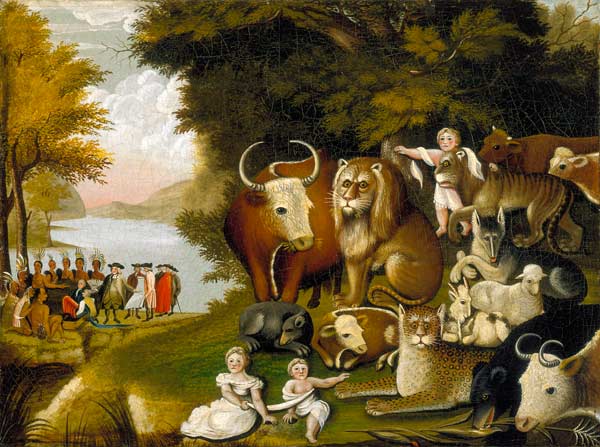
Spiritual Sunday
Today’s gorgeous Old Testament reading (Isaiah 11:1-10), which captures the spirit of messianic hope, has images that Milton uses in Paradise Lost. While Isaiah is envisioning the coming of the Messiah, however, Milton is looking back to the world before the fall. It can be again in the future asit once was in the past, Milton seems to be saying through his allusion.
In Isaiah’s vision,
The wolf shall live with the lamb,
the leopard shall lie down with the kid,the calf and the lion and the fatling together,
and a little child shall lead them.The cow and the bear shall graze,
their young shall lie down together; and the lion shall eat straw like the
ox.The nursing child shall play over the hole of the asp,
and the weaned child shall put its hand on the adder’s den.They will not hurt or destroy
on all my holy mountain;for the earth will be full of the knowledge of the Lord
as the waters cover the sea.
Milton describes Adam and Eve for us as they wander, hand in hand and naked, through the Garden of Eden. He adds some extra animals, including an elephant, to Isaiah’s list:
About them frisking played
All Beasts of th' Earth, since wild, and of all chase
In Wood or Wilderness, Forest or Den;
Sporting the Lion ramped, and in his paw
Dandled the kid; Bears, Tigers, Ounces, Pards
Gamboled before them, th’unwieldy Elephant
To make them mirth used all his might, and wreathed
His lithe proboscis; close the Serpent sly
Insinuating, wove with Gordian twine
His breaded train, and of his fatal guile
Gave proof unheeded; others on the grass
couched, and now filled with pasture gazing sat,
Or bedward
Dandl'd the Kid; Bears, Tygers, Ounces, Pards
Gambold before them, th' unwieldy Elephant
To make them mirth us'd all his might, and wreathd
His Lithe Proboscis; close the Serpent sly
Insinuating, wove with Gordian twine
His breaded train, and of his fatal guile
Gave proof unheeded…
C. S. Lewis borrows from Milton for his own Garden of Eden imagery in The Magician’s Nephew. Especially noteworthy is the elephant, who as in Paradise Lost wreathes her lithe proboscis. It’s a comic scene, with the newly created animals debating whether the wretched Uncle Andrew is an animal or a vegetable:
“And yet, you know,” said the Elephant…”And yet, you know, it might be an animal of some kind. Mightn’t the whitish lump at this end be a sort of face? And couldn’t those holes be eyes and a mouth? No nose, of course. But then—ahem—one mustn’t be narrow-minded. Very few of us have what could exactly be called a Nose.” She squinted down the length of her own trunk with pardonable pride.
I’m a bit peeved at Milton’s treatment of snakes, which is harsher than Isaiah. For Isaiah, asps and adders are no more dangerous than lions and leopards and bears, whereas Milton makes them guileful. It’s not the snakes fault that Satan enter’s his consciousness, yet God still unloads on the animal after the fall:
Because thou hast done this, thou art accursed
Above all Cattle, each Beast of the Field;
Upon thy Belly groveling thou shalt go,
And dust shalt eat all the days of thy Life.
Between Thee and the Woman I will put
Enmity, and between thine and her Seed;
Her Seed shall bruise thy head, thou bruise his heel.
Lewis, meanwhile, leaves snakes out altogether from his creation story but then brings them back in, equating them with evil women, in The Silver Chair.
That aside, peace prevailing in the animal kingdom is a powerful image in all three works.